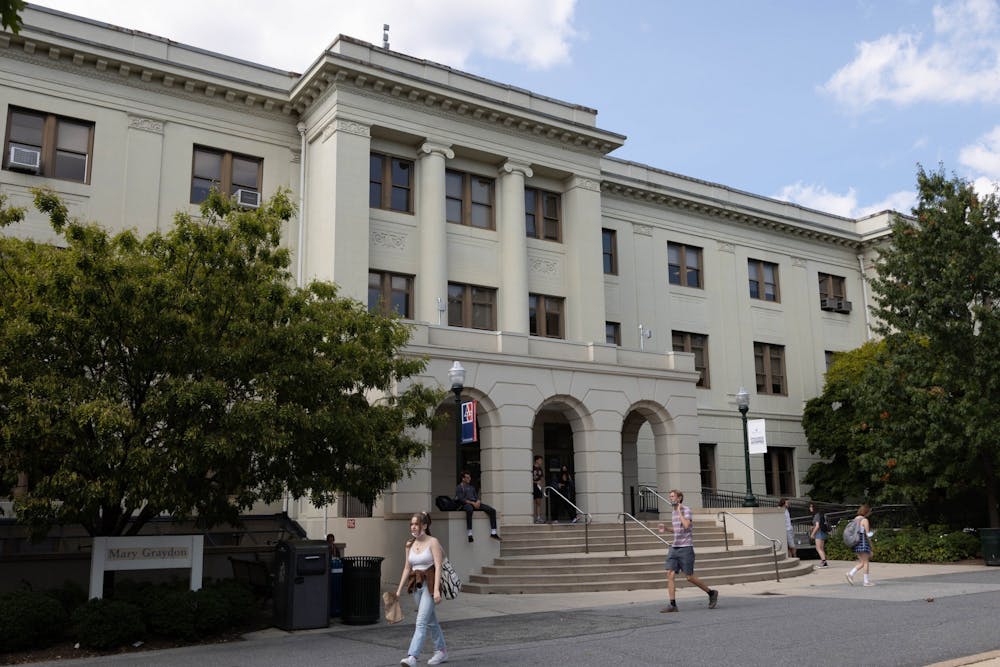The American University Student Government will use $45,000 to provide stipends for the 2022-2023 academic year, an increase of $1,000 from the previous year. The payments are for members of the executive board and their cabinets. Members of the Undergraduate Senate do not receive stipends, with the exception of the speaker.
Executive board members, which includes the president, vice president, secretary and comptroller, will receive the largest stipends, each being allocated $6,000 for the upcoming school year. All members of the executive board will see an increase in stipends from the previous year. The president’s stipend increased by 17.6 percent, the vice president’s stipend increased by 29 percent, the comptroller’s stipend increased by 36.36 percent and the secretary’s stipend increased by 31.86 percent.
Logan Galimi, SG comptroller and sophomore in the School of Public Affairs, oversees financial advocacy for the AU students as well as manages the SG budget.
“The finance committee looked at our governing documents and they were like we think you should all be paid equal,” Galimi said.
Alex Drakeford, a senator in the Finance Committee and a junior in SPA, said, “The logic was essentially that we did not want there to be a hierarchy between the executives in terms of payment, so we wanted to make it equal.”
Although stipends for executive board positions increased, some positions, like the speaker of the Undergraduate Senate and deputy comptroller, saw a decrease in the amount of money they will receive. Two new positions this year which are covered by the stipend bill are the executive chief of staff and executive chief of operations. Galimi said that these positions were created in an effort to streamline the process so that one person could accomplish the work that multiple positions used to separately complete.
“It's like, ‘Hey, you guys don't all need your individual chief of staff's. You can work together and we'll pay that one extra and then they can act as kind of a glue,’” Galimi said.
This summer SG adjusted and passed the 2022-2023 Academic Year Budget as well as a Stipend Allocation Bill. Both the budget and stipend bills were ratified by the Undergraduate Senate on June 3.
On May 27, SG Undergraduate Senate Finance Committee conducted a public forum with the AU community regarding questions on the proposed budget and stipend bill. These questions largely focused on the areas of the budget where there were the largest increases in funding. This allowed AU students to field questions regarding the upcoming changes before both bills were presented before the Undergraduate Senate for final deliberations.
Some of the most pressing pieces of the budget bill discussed were the increased funds for the Vice President’s programming fund to $14,500 from $6,000 the previous academic year. This funding is meant in part to increase awareness of SG activities and projects. In the 2021-2022 school year, these funds were used for giveaways and events.
Furthermore, Galimi said it was important to note that the programming boards are no longer allocated a stipend under SG so it was not covered in the recently passed bill. Those are people such as the Kennedy Political Union director and the Founders Week director that now receive their funds from the Center for Student Involvement directly.
According to Galimi, CSI determined that the student-led Budget Advisory Committee made up of students from SG, the AU Club Council and student media was not operating successfully, so they separated where the programming boards’ money would be allocated from.
Kydira Garfield, a sophomore in the School of Communication and the current director of KPU, said that the programming board’s funding not being tied to SG allows for more opportunities that would not have been available otherwise.
“It's a little bit more encompassing and gives a little bit more room to kind of do certain things that we didn't have the capabilities to do in previous years,” Garfield said.
Correction: A previous version of this story incorrectly stated that stipends came from an allocation of Student Activity Fee funding.





